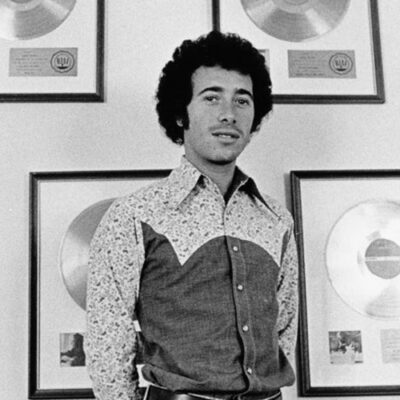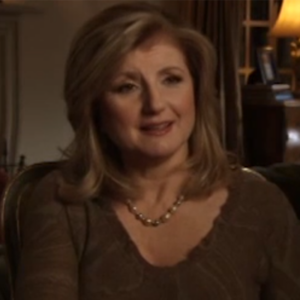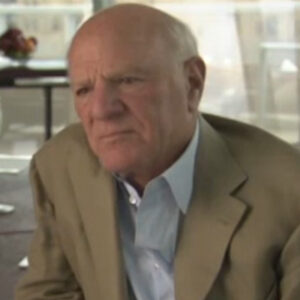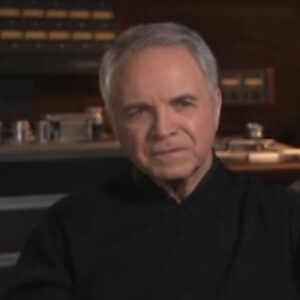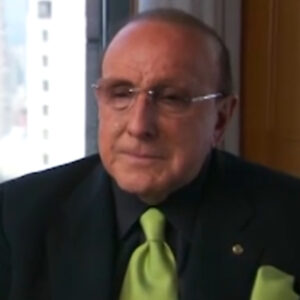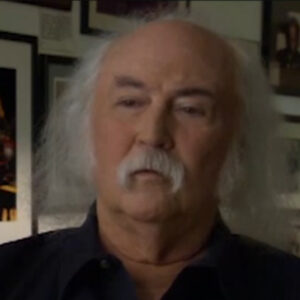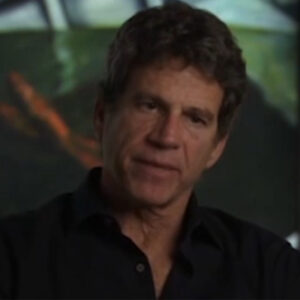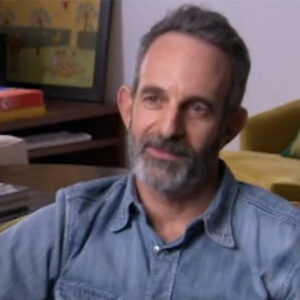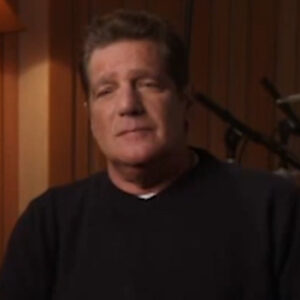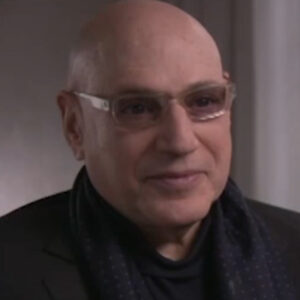Speaker OK, so let’s look. Let’s just start at the beginning. How did you do?
Speaker I believe it’s been a while, but I believe we met because Stan came in. Who is an agent that I worked for when I was at the William Morris Agency said you got to meet David Geffen because he’s really starting to collect art and he’s got the money. He’s got the ambition. And I think you guys would get along. And so I went out to Malibu and the same house that David’s been in all these years. And I met David there and we sort of started, you know, a friendship. And, of course, my agenda was as an art dealer, I do business with him. And he was a little bit uninterested in what I had to offer at that point because I really was just starting. And David already had, you know, some pretty good pictures. And so it was a little bit beyond me to really do business with David at that point. But we know things things kind of evolved from there over over many, many years. And what I think that would have been 77, 78, something like 30 years ago.
Speaker You know, David’s start club started.
Speaker I don’t really know. I can’t maybe he’s told me. I don’t remember.
Speaker Well, the story is I mean, just doesn’t sit back. Right. It’s interesting. It’s, you know, again, actually.
Speaker That’s right. That’s I think I’ve heard that.
Speaker Yeah. And they got a gallery in London. Right. You got to represent. Right. You know, that was his first. It was his first thing, you know. And after that, he’d built slowly. But that was one of the questions I was going to ask you is this, you know, sort of how easy has sort of evolved as a collector since you’ve him anyway through the years while he collected the collected a lot of different things that I’m aware.
Speaker I mean, collected he had a great collection of Tiffany lamps, which he put together. I think it was one of the best collections of Tiffany lamps assembled. And he sold it. And it was a you know, he had great timing. As David often does know, he sold it very, very well. And I think that kind of led into some American pictures. He was collecting people like Hopper and Hockney was an artist. He collected early on. I mean, when I knew him, that was sort of where he Sam Francis. It was. It wasn’t the kind of collection that he’s, you know, become famous for. I mean, what he amassed in the early 90s, it was really hard. He was buying art then, but it wasn’t it wasn’t as focused or it didn’t have the same level of ambition or concentration on, you know, getting masterpieces. It was a it was more a guy who obviously had a great eye and appreciated art, enjoyed living with it. But it was it wasn’t the kind of thing that it became, you know, in that period.
Speaker Just going back to the beginning, when you first saw David, did you sort of know right away. Hey, this.
Speaker Well, somebody you don’t want to waste his time. David, I’d like to get to the point. He I found it very cordial and and easy to be with on the one hand. But I knew there wasn’t a lot of time for small talk. So he wanted to know what what do you what are you here for? What do you have to offer? What you know and I appreciate that, because actually I prefer that kind of a conversation for the most part. And it’s sort of been that way for a long time. We have lunch sometimes in L.A. I’ll come over to the house and it’s just very efficient. And he’s got something on his mind. I have something on my mind. And, you know, sometimes it works, sometimes it doesn’t. But he’s you know, he knows. He knows what he wants.
Speaker People say that it’s true that you started to believe.
Speaker Well, I wouldn’t say I got my start at the William, whereas I was at the William Morris Agency. It was the start of absolutely nothing because it was it’s a career that never happened. It wasn’t it wasn’t where I was meant to be. But it was. It was a great way to kind of meet some people. I didn’t go into the entertainment world. I didn’t. But I made friends and associations and he’s given me a life of a very, very good name dropping ever since.
Speaker It was very useful.
Speaker They got this idea. But you were in L.A.. I was in L.A.. You were not in New York. Do you know?
Speaker I was in L.A.. I was on the El Camino and I was in L.A. and I wasn’t in that. I wasn’t in the mailroom. I was what? They didn’t have the mailroom. In those days, I was livid after David. They eliminated the mailroom. I mean, they had a mail room, but those were lifetime mailroom people.
Speaker It wasn’t there wasn’t the starting position that it was maybe five, 10 years before you started what they call the runs. You deliver scripts and prints. And he was kind of like a mail room. But it wasn’t the mail room for saying you were. It was. It was. It was. It was ninety dollars a week is what it was.
Speaker All right. So, I mean, why? I mean, I just.
Speaker Just briefly and I know you’ve had a very interesting story of how you started and, you know, you’ve basically built up from nothing to be incredibly successful. But just how did you make that transition? Why did you get involved in art? Why did you even start?
Speaker That’s a good question. And I’ve told the story a couple of times. I got started an art not thinking that I could get started in art. I was after I left the William Morris Agency, I was parking cars in Westwood Village. And it was, you know, it was a way to make a living. And that’s I was a graduate of UCLA and I’d worked at the William Morris Agency, building parking cars. And I saw a guy selling posters on the sidewalk. And I thought, I bet I could do that while I’m parking cars. They make some extra money. And I found out where they bought the posters.
Speaker And I buy these posters for a dollar two dollars apiece, put a frame on them, sell them on the sidewalk. I’m off of pegboard. And then I gradually started selling more expensive posters and then more expensive posters. And then I got a little frame shop and I stopped parking cars. And it wasn’t it wasn’t I had no intention of becoming an art dealer. Honestly, I didn’t even know that the profession existed in a certain sense. But it was it was a way to make money. And luckily, it was something that I had an aptitude and a talent for. So it led to something substantial in my case.
Speaker How I mean, how did you sort of discover for yourself and this is leading to your question also, David, that you had, you know, either you have it or you don’t.
Speaker I don’t. You discover it when when when you start enjoying what you look at. I think it’s it’s kind of a pleasure principle. I think if you if you like art and you enjoy looking at it, you probably have an eye. If you don’t get it, you don’t have an eye. I mean, they kind of go together. You really can’t put a collection together if you don’t have an eye or least not a not not it’s not a great collection for David.
Speaker He has a great eye. That.
Speaker I think it’s kind of innate. I think it’s kind of innate. I don’t know what it comes from. I think it’s just I think it’s just sort of the way your eye and your brain is wired. And, you know, I don’t know. I don’t know. You could have to do with what you’re exposed to. In my case, and probably in David’s case, I don’t think either one of us were exposed to a lot of fine art when we were growing up. I certainly wasn’t. I what I what I know about David’s background, like, pretty much the same, but I think I had a very strong kind of visual sense. And looking back, I recognize that. But at the time, I really didn’t know that it would lead to something, as you know, to be an art dealer. It’s just like looking at things and studying the way they look.
Speaker And it’s fascinating because, David, I don’t think you can teach somebody.
Speaker It’s like teaching somebody to sing. And I’m not saying it’s that kind of a talent, but I think some things are a little bit innate in either you you can develop them like any talent, but it’s either there, it’s not there.
Speaker I think to a large extent it’s funny cause I was just looking at her first interview with David. We’re doing another week at the Beverly Hills Athersys. We were in Malibu last time. Right? The art collection.
Speaker Oh, yeah. Big, big difference. Big difference. So cool.
Speaker But he was saying that you think same thing about the entertainment. He said, I didn’t know there was even a business of entertainment. He’s like, I just love the movies. And I just thought, hey, you know, it’s like I don’t even realize it wasn’t a business behind this film.
Speaker I’m saying the same thing in a way that’s true.
Speaker But it’s interesting that you two have in common. I mean, the two of you seem to have some things in common about you, which is that you both sort of. Came from not a tremendously fancy background, right?
Speaker Our self-made man. Right. I mean, do you feel at all like you guys are kindred spirits in that way? If you ever felt that way? I have.
Speaker I have felt, you know, a lot of people who have that kind of a background, you know. But particularly with David, for some reason, I can’t put my finger on it. But I’ve always said I have an affection for him that kind of goes beyond the business we’ve done.
Speaker Now, what kind of passion and drive cake when you come from. Nothing to be successful.
Speaker I can’t speak for David. But I think if you really like something and you get you get positive feedback from it and you get in, you in you achieve some success. I think it’s important that you’ve achieved some success kind of early. So you’re not discouraged too much in the beginning. And that in a lot of that’s luck, whether things break for you at a certain point. And I think it’s it is that virtuous cycle that, you know, things start going well and that motivates you. And if you don’t screw up too badly, you have a chance to build it into something significant.
Speaker But I think I think luck luck definitely plays and plays a hand in everything. You’ve been at the right place and having good luck is is definitely part of every story. Yeah, right.
Speaker Right. And that would mean anything, right.
Speaker It doesn’t feel like hard work if you like what you’re doing. So I enjoy hard work. I enjoy work. And I think people who are successful in general enjoy what they do and they don’t see it so much as she’s. What time is it? I got to go home. It’s it’s you know, I think we’re the lucky ones, in a way.
Speaker So.
Speaker Just kind of the basics, which is what what is so great about David people?
Speaker It’s just it’s. It’s an amazing collection when you know when you know, when you know the feel that David’s collected in, which is primarily post-war American art. I mean, he has a couple of things that are kind of outside the box, but over 90 percent, what I’d say would fall into that category and abstract expressionism, pop art and the level of the level that the collection is just it’s kind of amazing. I mean, people go to David’s home and they see the collection, people who’ve seen a lot of great collections. They did. They’re flabbergasted. It’s that good because he had every picture. Is that, you know, is that important and not just important, but how did he get it? You know, jeez, look, he’s got that one look. He’s got that one. And that’s part of collecting is is the excitement of getting something that in a certain way seems inaccessible. And David, I think he pulled that off, put that collection together better than than anybody I’ve I’ve run across. And he did it in a relatively short period of time.
Speaker When you talk about any particular stand out, David has a chance.
Speaker Well, yes, it’s incredible. Jasper Johns painting the target with the plaster cast, which is one of one of the one of the most famous and important works of post-war art that’s hanging. I think it’s over his fireplace. I mean, he’s got he’s got he’s got an incredible de Kooning interchange. He’s got a great Pollock drip painting. He’s got, you know. I mean, the collection is is he sold a few things as well, as we all know. But what he has left, what he has left is still blows away just about any collection you can you can think of. I mean, that’s that’s it was such a deep collection. And there were so many masterpieces that he had the luxury, if you want to put it that way, to sell it, you know, to make some money to to kind of change, you know, his asset allocation. If you want to call that and still have the what remains, you know, is is still unsurpassed in in it in its field. I mean, one of the greatest. There’s a Gorky show right now just opened at the Philadelphia Museum. I mean, David has a Gorki that’s as good as any Gorki. The artist, you know, painted. I mean, it’s it’s just on and on.
Speaker I mean, how unusual is it for individual places?
Speaker It’s unique. It’s it’s it’s it’s it’s it’s unique because I mean, the collection really is unsurpassed. I mean, in its totality, it really is unrivaled. And he did it at a time when when as you probably are aware of, he did it at the time when the art market was absolutely, you know, in the in the in the dumpster. I mean, the people were not buying art and people were very gloomy about the economy in general. And they were particularly gloomy about the art market and even people who had as much money or in some cases more money than David Geffen and and collected art and wanted to continue to collect. They were they were very nervous about where’s this thing going? Am I wasting my money? Is this you know, I mean, it was it’s hard to imagine now because in it in the cycle, we’ve just hopefully coming out of which has been, you know, a very, very rough recession. And we still have a ways to go, obviously. Also for the art market. We’ve had we’ve had a contraction. This has been mild compared to what what was going on the early 90s. I mean, this the economy may have taken a much bigger hit in America and the rest of the world, but the art market took a much bigger hit in the early 90s because it really there was a much smaller market that you didn’t have as many foreign buyers. You had MASC, basically people wanting to sell art, not want to buy it. And David was just out there with the with the capital and with the nerve and with the eye and the ability that he was as quick as a rifle. I mean, he just didn’t you know, I mean, you have collectors now. They have 20 advice. I think advisers are great. But I mean, they would basically put this collection together by himself. You know, he had a couple he used to talk to Kirk Varnado. I think he you know, I mean, I was the dealer who did a lot of business with him, so I’m sure he knows that as a dealer. My advice is somewhat could be could be regarded as self-serving, but I think he’s still respected my advice, even though he knew I was trying to make a sale. I think he had confidence that I gave him, you know, pretty good judgment. I wasn’t just trying to sell him a painting, but you did you didn’t really need to tell David that much. He really got it and he really got it. And that’s amazing. It’s amazing also because it was an area that he hadn’t been collecting. I mean, he did. He had this kind of American collection that I described with Sam Francis and Hopper and Tiffany, and it was a totally different thing. And now he’s going into an area where he hadn’t collected. I think I think I remember now we were at the Museum of Modern Art and I think. It was the Bill Paley collection was being shown there, if I’m not mistaken. I could be wrong. I think I think I remember that we were there and he was with. I was walking around with David and Barbara Walters and he saw what Bill Paley had given the moment and he saw what one collector had put together. And also not not it didn’t it wasn’t lost him and that was it. There was a it was a well wealth that was generated from from media. And I think that kind of resonated with David in some way. Bill Paley. Course.
Speaker And I think that a light kind of went off in David’s head that, geez, look, I can do this. I can afford to buy art at this level. There’s an opportunity for me to do something like this. I’m going to do it. And he he’d move very, very quickly and invite attention. People move that quickly. They make a lot of mistakes. He didn’t.
Speaker It’s it’s it’s really it’s it’s really incredible. And I’ve told I’ve you know and I’m know I’m not just saying this because because we’re doing, you know, not a nice story on David Geffen.
Speaker I mean, I’ve told everybody this. I mean, it’s just unbelievable how how how quick and insightful and and kind of brave he was as a collector.
Speaker Now, was this around the time when he sort of sold Geffen Records? And so he he was he had the liquidity.
Speaker He had sold the company. And then the stock got sold again or I don’t remember exact. And he sold it to Mahsa hidden. Yeah. Much mushes it require them so that that liquified his shares and so he had a lot of cash. He always I think was a very wealthy guy, but he was now became, you know, extremely wealthy. And he had he had the money and he just decided to buy it to buy art and personal.
Speaker I mean, that’s like bite on a big scale, bite on a big scale.
Speaker David is a decisive, decisive person in his home. Right. He never said maybe. Right. Right. Right. But this is one of my questions, because you left so many questions now that you just said that because, you know, one of the questions is how did the two of you work together? You seem to be quite busy. And you say you want this.
Speaker Where is this painting that would that would be a conversation sometimes or I would say something is available. I would be aware that something was available. And I’d suggested sometimes he knew about something. You say you think we can get this? He would try to. You know, sometimes he would point me in a certain direction. That was sort of the way I worked with a lot of collectors that that dialogue wasn’t particularly unusual. What was unusual was the amount of money he was willing to spend and how decisive he was and that he bought at a time when people really felt that the world was coming to an end, at least the art world coming to an end. And they were very, very nervous. And there were people who could’ve written the same checks as David and wanted to buy the same kind of paintings that he bought and just didn’t have the they couldn’t pull the trigger. So he had a vision. He had a vision. Yeah, he had a vision. He saw it. He saw himself putting this collection together. And he was very focused on what he bought. He didn’t he didn’t just he wasn’t like just all over the place. He brought in a very, very, very, very focused way, the only one of the best. He really just wanted incredible quality and an incredible rarity in what in what he collected. And those those are the things that always, you know, retain value and become much more valuable.
Speaker But I mean, when you say I mean, how big is this collection? How many? How many?
Speaker I don’t know the exact number. 40. It’s not a it’s not like they’re cultures that have 200 paintings. Three hundred thousand paintings. But I prefer honestly, I prefer the way David collects because he bought just the best. I mean, it’s very hard to do that. And he conceptualized it and he saw that it was possible that this is something he could put together. Cy Newhouse was selling quite a few paintings at that time. He’d moved into a much more restricting apartment as far as what he could accommodate, and he wanted to sell quite a few things. So that was a big block of things. That was an opportunity. He bought a lot of Cy Newhouse’s paintings. There were other situations that came up where people wanted to sell, needed to sell. David was very opportunistic, very quick, and was a pleasure to deal with, pleasure to deal with.
Speaker Now, when you say that he you know, that the art world is a gloomy at the time, people would think, would you say that he was sort of a trendsetter? People sort of found his way.
Speaker I think he set a good example. But I don’t know. There was nobody really buying art at the level. He was in the area that he was. And I remember David saying to me once that let’s say a painting was X million dollars. And he say, Larry, I don’t there’s anybody else out there that’s going to pay anywhere close to this. And that didn’t bother him in a way he would still buy it. I mean, he wasn’t stupid about spending money, but he knew that he had to be a little bit aggressive to get to get the kind of things he wanted to get.
Speaker And he really liked that he had seen something in someone’s house. Do you think that person.
Speaker Yeah, that’s right, but that’s a lot of collectors, do they? But David, you know, follow through on it. I mean, that’s not unusual. But but but wasn’t what was unusual was that he did he actually did it. And other people probably thought about doing it and he did it. I mean, that’s sort of I think the way David is in many respects. He knows how to turn an idea into action and to get in the end to get it done. He’s he’s he’s one of the most efficient minds I’ve ever, you know, I’ve ever I’ve ever I’ve ever been in contact with him. He really is extraordinary in that regard. Without it, he’s very results oriented. And he he knows how to do it. He’s very, very efficient.
Speaker So what about that, David Geffen? That certain something that he has? I mean, you’ve said some of it, but, you know, what is it that you think makes it kind of unique? It stands apart?
Speaker I really don’t. I really don’t know. I mean, it’s hard to describe somebody who’s unique because because you don’t have other people to refer to. I mean, I think he’s a. You know, I think like many great men who’ve accomplished extraordinary things, there’s there’s something about their their character that you really can’t fully grasp. And that’s what kind of makes them genius and kind of makes them unique. And I think David’s one of those, you know, one of those people. It’s I don’t know how to put it into words exactly, but he’s extremely intelligent and in and has a penetrating kind of ability to get to the heart of what he needs to know and what he needs to do.
Speaker And he doesn’t really waste time with a lot of extraneous things. I mean, he’s you know, people talk about focus, focus, focus. That is is to be successful. You need to be focused. It’s a word this I mean, overused. But if there’s any body that that really applies to it, something like David David is is has an uncanny focus.
Speaker Actually, you did a great job, as you said you could do with it. Yeah.
Speaker So this is true that David.
Speaker So, I mean, the largest sum ever paid for one painting or seven a plaster.
Speaker I don’t know. I don’t know. I mean, I’m not really focused on it. Well, I mean, I saw paintings for some staggering sums, but I don’t know if that’s been surpassed or not. Well, these sales are private, so you don’t really nicely.
Speaker I don’t know. I just saw you know, I was doing my research and there was one piece in The New York Times that said that his you know, his Pollock, basically, it’s overall it’s over.
Speaker It’ll be a huge price, you know.
Speaker So.
Speaker And what I mean. I don’t know if this is a good question, but is there any way you can characterize David’s art collection as being any kind of reflection of him? In other words, what he didn’t decide to go get some old masters that he went for a particular kind of a life that appealed to him?
Speaker Well, I think it appealed to him because I think he really genuinely respected those artists and he kind of understood them. They were in a certain way, you could say they were part of his generation.
Speaker I mean, he grew up in the 40s, the 50s and 60s, and the art he collected came from the 40s, the 50s and the 60s. So maybe even on a on some perhaps subconscious level, I think he felt a generational affinity for those artists. And I think those are you know, he’s a he’s an American. And he but he put together an American collection. I’m not saying he’s a patriotic collector, but I think that was something that he found more accessible.
Speaker And I think he also recognized that to put together a collection like that of Impressionism or Cubist after it was virtually impossible. I mean, you really, really those pictures are almost impossible to get. Now, they’re the great ones are in museums. Almost all the great ones are in museums or they’re in places where they just don’t come out. And what David understood intellectually and I think also instinctively was in the area that he focused, he could still put together the greatest collection. I mean, it rivals the Museum of Modern Art or any or any.
Speaker Couldn’t do that in. If he went if he pushed the clock back and why he couldn’t put together the greatest Picasso collection, he couldn’t put together the greatest Monet collection, but he could put together the greatest collection of really great art. So which is not the greatest collection of cookie jars, which probably could also be done. So there was this kind of the cross hairs between what’s really significant and important and what can I actually achieve? What can I put? And I think he’d like his mind is like a computer. I think he just he knew that this was an area that he understood that he had an emotional connection to, that there were still enough great things out there in private hands. The Newhouse collection, you know, gave him a big chunk of it. And then he’s now going to fill in the gaps and add to it. And, you know, he just he became very, very ambitious and proud of the quality of the collection and which is typical of many collectors, but they just don’t do it as well. And they well, of course, you have to have the means. Obviously, David had the means to do it. But it even people is, as I said, even people who have more money than David. There’s always somebody out there that makes you feel poor that they didn’t you know, they didn’t do it and they could have done it.
Speaker He did it for.
Speaker So has he reached his goal as a collector? I seems like he’s taking a bit of a pause.
Speaker I mean, I don’t know, maybe doesn’t like the way the market is right now. Or maybe he’s it’s a chapter he’s moved beyond in some respects. I don’t know. I hope he comes back to collect and I think he will. I think he he he he still you know, he’s still interested. And he calls me before an auction. He asks my opinion about things. We talk about art, but I don’t. There was a period when it was just a constant daily thing. I mean, it was. And I think that that kind of that kind of that part of that part of his collecting life for the time being is is is put on been put on hold. But you never know. Market takes another dip. David will be back.
Speaker So we’re about we’re about two thirds of the way through. Are you OK?
Speaker No, I’m OK.
Speaker So here, you know, David’s personal style is kind of, like you said, the poster child for California.
Speaker Right? You know, even T-shirt. Right. A cap on backwards. Right. That’s kind of signature like. Right. What happens when he shows up at an auction?
Speaker I went. I went. I went to an auction. I remember going to an auction as others dressed like that. And I thought it was I thought it was a hoot. I thought it was a victory. Who the hell is this guy? And he just sat there and I bought, you know, about pain for a few million dollars. And then I knew he was.
Speaker But, yeah, he’s not going to show. I mean, I don’t think David does it, too.
Speaker I don’t think David does it particularly for effect. I think. I think he’s comfortable wearing clothes like them. You know, if he felt comfortable, a certain type, wear a suit and tie. I think it’s just what you know, it’s just that he likes to he’s not going to dress up for, you know, for an auction.
Speaker So it’s not. I mean, it’s like it’s known as kind of a stuffy world, right. It’s hard to imagine.
Speaker You know, David, kind of it’s kind of refreshing when you think about it. It’s kind of refreshing because at the end of the day, if you got the checkbook and you know what you’re doing, doesn’t matter if you got jeans and T-shirt on just matters was, you know, up here.
Speaker OK, so, I mean, is it is it.
Speaker You said that, David Scotchmen rivals some even some better than many of better than most.
Speaker I can say that absolutely.
Speaker I mean, he has paintings of museums, which they had and, you know, museums, they they have their limitations as far as what they can afford. And they they have to go through, you know, committees. It’s part of the process when almost all museums have to go through a committee process. They have to look for the money. They have to they have to get trustees. You know, they have to. That’s what they have to do. That’s just the nature of of museum collections. In almost every case are some museums that can they’re a little more autonomous. But David, being a, you know, a single guy who doesn’t need to talk to anybody about his decisions really could, you know, could could could move very quickly. And that’s a big advantage when you’re collecting art. You go into somebody’s house and look at opinion. You know, this guy’s not going to call in a decorator, call him an adviser so he can look at a painting. If he likes it, he knows he knows what it’s worth. He knows if you know. So as a dealer and he’s kind of an ideal collector because, you know, there’s not going to be like five viewings and he has to come back and then consult with people. And I’m not saying the guy was haphazard at all. He was extremely disciplined, but he just was very, very quick. And that’s the kind of person a dealer wants to call up. You don’t always want to call up a collector who’s going to have a, you know, just an army of people and advisers because, you know, the person who’s selling the painting probably loses Bliss’s patients. And what nice thing about going into a collection with David is if he liked it, you know, you’d get a quick answer. He wouldn’t drag it out.
Speaker So we were talking before about how David.
Speaker And he would say that would require.
Speaker Right. Right. Did the flip side of it happen where you said to David, I have some other things in your ass?
Speaker Oh, yes, absolutely. Happens with our collections. I mean, they’re collectors are gonna always get both phone calls on the buy side and the sell side of somebody who might be interested in buying a painting.
Speaker And it’s sometimes there’s an interest in selling. Sometimes there isn’t. I mean, very often there isn’t. I mean, it depends on the timing, the circumstances. But we had those conversations also.
Speaker I mean, would he be willing to part of it at the right price?
Speaker I don’t think so now. I mean, I really don’t know. I mean, David, you know, plays his cards fairly close to his chest, which is which is usually a good policy in art and other matters. But I don’t I don’t think, you know, maybe if there was some incredible situation. But I think in general, my sense is he’s really not interested in selling anything right now.
Speaker You know, I just don’t think he wanted to sell some paintings at a certain point and he sold what he wanted to sell. And my sense now is he’s he’s very happy with the paintings he owns. And, you know, hopefully he’ll he’ll he’ll resume building the collection because I like that part of it even more, even though some more action, David.
Speaker So, yeah, we’re talking about that day when he was looking at the painting. Right at the moment.
Speaker The moment. The moment. Yeah. That would have been early. Yeah. Just about when he started. You know, I think that kind of was a kickstart in a way.
Speaker What kind of thoughts do you think he has about his legacy and what’s going to happen with these paintings?
Speaker I don’t let people speculate about it. I don’t know. I don’t know if he’ll if he’ll give them away or sell them or create a foundation. I have no idea. I mean, I don’t think he’s my hunch is he probably hasn’t decided completely what he wants to do, but I really don’t know.
Speaker But it’s an important thing. I mean, if you’ve got a collection like that, it can’t escape your mind.
Speaker No, it’s a huge it’s a huge even for a very wealthy man like David. It’s a huge asset.
Speaker And what typically would happen with it, with a collection like it is after you sell it?
Speaker Sometimes, sometimes they have to be sold, unfortunately, to pay taxes. Sometimes they. You can set up a foundation where they’re there. You know, like Norton Simon did. And like many collectors have done where they’re shut, you know, where they’re maintained and the public can see them. I mean, that’s that’s they give them to museums. You know, David’s Fantasias, single man. So, I mean, this is options within the family or probably a little different than a lot of other people. I don’t know what David’s going to do with the collection.
Speaker That’s a fair question we should ask you. I don’t just.
Speaker Yeah, I don’t know. I guess you could ask him.
Speaker I mean, we will, because I think it’s it’s kind of an interesting thought because here’s a man who this is. Isn’t just curious. Right. That really, you know, I mean, you know, he must have some thoughts about what’s my legacy going to be. I mean, he’s done incredible philanthropy and that’s a legacy.
Speaker Well, I think was you know, I think I think I think it’s great that with all David’s accomplished and his story is extraordinary as a great American or forget American, just a great success story, period. He’s done so much. You know, he’s he’s done so many things at such a high level and achieved so much that his art collection is one of the things that he’s really known for.
Speaker And, you know, to have a collection that that rivals his other accomplishments is a further testament to what a great collection it is, because there’s a lot of people in Hollywood who collect. But, you know, it’s kind of like they’ve got some stuff on the walls. David’s collection is, you know, world class, to say the least.
Speaker Thing that made me think a little bit. I don’t think there’s any. David, would you categorize Dave as a person who has achieved the American dream?
Speaker The way I defined it, he has I think everybody defines the American dream in a different way. But the way I would define it, because it’s it’s close. In some respects, it is close to my story. I think it’s a it’s something you the American dream means a lot because it’s something you really can’t do in in any other country the way you can do in America. There’s no other country that has the opportunities that America that America offers you. And I think David. You know, David is one of the great success stories that America’s produced.
Speaker So.
Speaker He put I mean, this is can you put the notion of kind of a private collection like this, just like aggressive private collection, is it? I mean, how much of it is about aesthetics and how much of it is about commerce? Where’s the commerce?
Speaker You know, that’s a good question. You know, I think it’s a mix. I think it’s always a mix of those things in them and the mix in the mix changes.
Speaker I think Dave is very, very honest about that. I mean, he he he knows it’s it’s business. He knows it’s money. He knows it’s an asset. He cares about its value. He cares about what he pays for. He cares about what it’s worth. And I think that’s normal and that’s healthy. I think a lot of collectors pretend that it’s not, you know, you know, central to their to their to their thinking or their how they rank their collection. I think David’s very honest about his is, you know, it’s great. But it’s also it’s you know, it’s it’s money on the walls. It represents, you know, a big, big asset. And I think I don’t know, I think they’re both important. And I think for a collector to deny that they’re important really is probably it’s probably not being honest. I think that, you know, I don’t think David would argue with that. I think he knows he knows exactly what it means. But I don’t think that diminishes his appreciation for the work. I know he I know for a fact that David really loves looking at those paintings. And and even though he does, as we all know, spend more time in Malibu than in the city house, I think he really takes an enormous pride in the collection and not just pride when he’s showing it. I think he really likes, you know, walking through the house and saying, jeez, I’ve got this. Wow, look at that. Look at that. I mean, it’s enriched his life a lot. I hope it hasn’t. I I’m pretty sure it is.
Speaker And what must it feel like to live amongst such incredible works of art? I mean, I’m sure no one, no normal person can imagine, you know, walking to your house.
Speaker You see, I guess you get you to anything, but it’s got it. You know, it’s got until somebody comes in and just like falls on the floor in front of your Pollock. And then you realize this must must be pretty good.
Speaker Have you been to the house? Of course, you must have been of every house. Yeah, I’ve been there many times. You know.
Speaker It’s beautiful house. It’s a beautiful. And that’s another thing interesting about David. It’s it’s that he put this collection together kind of outside of the of the typical scope of the art world.
Speaker And he’s not he spends a fair amount of time in New York, used to have an apartment here. But he’s not really a New Yorker by any means. He doesn’t read. He’s not really a museum guy. I mean, he’s been generous with the with the museum in L.A., the Geffen the Geffen Museum. And he’s but he’s not really. He’s not your typical art collector in the sense that he goes to gallery every Saturday or is on a lot of museum boards where he really doesn’t that that game just as an appeals in maybe the rest of his life as such. He doesn’t feel like he needs that socially or maybe I don’t know what the reasons are, but.
Speaker And so he put his to collect collection together, you have to understand in an office in a certain kind of isolation. I think it makes it more remarkable. I mean, it’s not like a guy living on on Fifth Avenue who’s plugged into 20. I mean, David’s incredibly plugged in, but he did it almost like remote control. He did from L.A. He did it from kind of a Hollywood background. He did it from outside of the box. And I think that makes it even more exceptional the way because he’s an he is. He just did it. It’s kind of uncanny that he was able to understand the value of those works, figure out how to do it, and then do it from a relatively isolated kind of Hollywood kind of environment. I mean, his life is not spent with curators and museum people and dealers and artists. I mean, I don’t I don’t think he is not like he dislikes those people. It’s just not his world. And most collectors who have anywhere near the kind of collection that David has. You know, they’ve got they’re much more in in the in their lives are much more part of that fabric. And that that that’s always kind of fascinated me about David, that that he did it from L.A. and, you know, and he did it without really ever grafting himself onto any museum or he’s not an art busybody. He just he kind of did it almost like an abstract thing.
Speaker It’s pretty, pretty cool.
Speaker You know, it’s just not his deal. He’s just not his deal. It just it doesn’t interest him. You know, he’s got his life. He’s got his personal life. He’s got his friends. And he was able to, you know, at the same time just pull off like the greatest art coup, you know, in recent in recent. In recent memory.
Speaker Yeah. You know, he’s got the boat so good.
Speaker So, I mean, what kind of. I’m not sure what the questions are. What kind of kind of moral social obligation comes along with such an obligation then to an exhibition or.
Speaker That’s that’s that’s a that’s a subject that comes up a lot. And David, just because of because of the incredible value of the pieces and they’ve grown in value dramatically since David acquired them and the insurance and the and just the, you know, the world that we live in now, you know, the fragility of these works. I think he’s he’s not somebody who’s, you know, you know, always willing to lend. And I understand that.
Speaker I mean, and then under the right circumstances, with the right amount of arm twisting, sometimes he he he he will end. But you can’t blame him. He lives with these things. It’s a tough call. It’s a tough call because he also knows that by lending these paintings, it increases their stature. And it’s good that it’s a very civic thing to do. It’s there. But on the other hand, he doesn’t want to take them. He doesn’t have like a warehouse full of backup paintings. He’s not that kind of a collector. I mean, some collectors have like 500 paintings. They shipped two or three out. They bring them in from storage. David doesn’t collect that way. He he he collected really four spots in his house, which which in no way suggests that he collected like a decorator. But he wanted things that he could hang in certain places in his house and certain paintings. I remember often they were too big or they were too this. And that’s interesting, too. He didn’t he didn’t just keep buying paintings and warehousing them like like like an asset. He bought paintings to live with and to and to hang to hang in his home. So for him to lend a painting in addition to the, you know, the vagaries of shipping and exposing them to public, you know, blah, blah, blah.
Speaker There was also the reality he didn’t really have that many paintings, you know, to to juggle around.
Speaker A great answer. Thank you. So we talked about that, we talked about that.
Speaker So, I mean, I think you’ve touched on this a little bit, but I mean, I guess in all other areas of his life and business, I mean, David is known as the toughest negotiator and he gets what he wants. Heads up, in case I you know, honestly, I don’t think he.
Speaker That’s not been my experience. Disappoint David. No, he’s he’s a very you know, he’s a very, very, you know, tough negotiator. I know. On the one hand. On the other. On the other hand, I honest I can say honestly, he’s he’s he’s a fair negotiator. He he wants he wants to get the best price he can. Any collector wants to do that. But he’s not a neurotic negotiator. I mean, some people just say they want to negotiate more than they want the picture. They just want to keep negotiating, keep negotiate. It becomes a negotiation thing. David wants to get find out what the best prices. If he’s buying something or more recently, when he sold it, when he sold a few things, he obviously wants to get the very best value if he’s going to sell the top dollar, any collector does. And when he was buying paintings, he he you know, he didn’t want to get screwed. He didn’t want to overpay. But he was I would say that he was kind of reasonable about it. He you know, he knew when were doing a deal was OK. And he wouldn’t just keep grinding and grinding. So I would say he was tough, but I would say also he was, you know, very fair, to be honest with you, honestly.
Speaker That’s what other people have said him, that he hasn’t really good. He’s great seeing the big picture. And he sort of knows, you know, to beat somebody up too much.
Speaker They’re not going to come back. First of all. Yeah. And he just doesn’t have time for that.
Speaker So. So I’ve worked with you.
Speaker I don’t know whether he should have put it, but I mean, you and David, there’s something that you and David have in common about these incredibly successful guys. And sometimes, I think come with a little bit of a reputation. Maybe people say, oh, well, he’s so tough. And he said this. And he said, I mean, you know, I feel like in some ways it is a struggle to get that reputation a little bit, you know, things that have been in print. He says that’s not true.
Speaker I don’t believe anybody. Right, right. Right.
Speaker I mean, it’s a little tough to live with, though, when you’re when you’re in a sort of far out ahead of the pack, you know. Do you feel that at all? Can you understand that or sympathize?
Speaker Absolutely. Absolutely. Very much so.
Speaker Well, yeah. I mean, I think I think it’s I think if you’re successful, people are going to want to rock your boat.
Speaker I think it’s you know, it’s. And if you get more if you head towards the top of your profession and you become more dominant or more secure, I think people you get a lot of envy in the world. And I think most of it, you know, most of it is just really misplaced envy. And I really mean that. I don’t think I think my case I’d you know, I just go out there trying to do a good job and have and run a successful business. And people want to poke fun at, you know, want to poke at you. It’s OK. I don’t. It’s OK. It’s not that big a deal. It always is. You get used to you get used to it. You get used and you get your David’s. I get is that if it’s a different lead he’s had to deal with and what I’ve had to deal with, I think that’s true. People who who’ve become, you know, Husak, who are successful in whatever field they’re in, that there’s gonna be people who are envious and people who want to detract. And I don’t it doesn’t come as any big surprise.
Speaker Were you surprised when David started publicly, came out in 92, 93? At the end, he was getting some big award and he made this declaration, you know, I’m a gay man come this far. And I was surprised by that.
Speaker No, not at all. I wasn’t. But I mean. I mean I know David. I know David very well. I know as vinos personal life. And I it was just the natural thing for him to do. I mean, I, I can’t imagine him handily in any other way. I mean, he’s not going to he’s not going to play any games or why would he. You didn’t. He has nothing to be embarrassed about. He just I mean it’s it’s it’s it’s a sign of his his mental health that he’s dealt with it that way. And there’s nothing to deal with it. Just the way, you know, everybody’s different. What what what difference does it make to make a change?
Speaker He was going to change his life. In what way?
Speaker Made public declaration that people look to him as a role model in some ways?
Speaker Yeah, I think so. I think I think I think in the gay community, he’s gotten a lot of a lot of respect and credit for that, for the fact that he was one of the kind of one of the most prominent people to kind of come out and just say, look, you know, this is me, this is who I am, you know, take it or leave it. If you don’t like it. Too bad.
Speaker That’s something.
Speaker For once, he was there was a funny I was in Malibu and we were having lunch and he got a phone call and it was something a 25th anniversary, fiftieth anniversary. Warner Brothers, Steve Ross was hosting something. And it was a big deal. It was like a blackout. I can’t remember. I’m a little bit fuzzy on it. And they were talking about what table? I could tell that I could hear the other side of the conversation, just what David was saying. And I’ll never forget this. It was really kind of amusing because David has a great, you know, kind of wicked sense of humor. And and and they were talking about seeing arranger’s.
Speaker And David just said it would be OK for me at the gay table.
Speaker He liked elected me. And it is like that. We’ve both cracked up because it was like it was a big, big dig.
Speaker Big Warner Brothers, fiftieth out of I can remember was a big deal. And it was just kind of here in the side of the conversation. I can imagine with the other side was that that was very funny.
Speaker Very David O put me at the gate table.
Speaker I think you’re also. Is there anything else I can ask you about? I don’t know. Is there any particular piece of art that David has just fallen in love with that you could think of where you said, you know, I think he like I think he likes that.
Speaker I couldn’t. I think, you know, I think he likes I think he likes them all. I think in different ways. I think he really he knows why they’re great. He knows why they’re special. He knows why they’re hanging in his house. I mean, you know, there’s just not a clunker in the collection, you know, that’s in there. And that’s that’s hard to do also. It’s one thing to put together a great group opinions and then have maybe 10 of them that aren’t so good. It’s all mountain, it’s all peaks. There’s no valleys. And it’s I know I sound patronizing, but it’s it’s the honest to God’s truth. I mean, there really there’s not there’s not a there’s not a dud in the collection. And that that goes even beyond putting together a great collection. Lot of people to get a great collections. But you go in their house, you say, well, jeez, this isn’t so good at this. This is a weak example that you can’t say that. You really can’t say that. Every one of them is kind of a star.
Speaker He went the top. He went for the top.
Speaker But he knew what the top was. You can go for the top and not know where the top is. And so you have to have the ambition and also have the intellectual and the visual sense to put it together.
Speaker I mean, unusual is it for a business if you show somebody a great painting and they don’t know it’s a great painting? How can you tell me to buy a great painting? I mean, you got it. You just because it’s expensive doesn’t make a great I mean, he knew the difference and and that’s why it was it was very interesting and enjoyable to work with him because you him something great and he gets it, you know, he he just gets it. You know, you just he didn’t have to give him a lot of B.S. He just kind of got it.
Speaker Well, that’s one of the things that we all were. I mean, you know, is a business. I mean, he’s a businessman. He’s got it right.
Speaker However, he has this incredible aesthetics that just extends to music into town, to Broadway and to landscaping, architecture, furniture, boats.
Speaker You know, he’s gonna he’s going to he usually goes that way. I think it’s hard to have a great sense of painting and sculpture if you don’t see other things in the world.
Speaker All right, Emma. You got anything? We have one more question after that. I would say that bookable.
Speaker Oh, that’s a good that’s a good. OK, well, you know, different for baby. Yeah, course. Yeah.
Speaker Anyway, that when I was I was telling you before about that thing where he publicly came out, it was for the AIDS project that he was winning a reward. And I introduced him that night. And he said he was interesting too, to give an aide described him as a captain of industry with the soul of an artist. Nice. Well, anyway, I think that’s true.
Speaker Yeah, sounds great. I mean, they usually say about me. But I’ll let them have it. Now, it sounds great. I did. He’s got his. He’s got easy. He definitely has this all Banaras I mean, like he did with with music and film.
Speaker So he’s got that. He’s got that. You know, he’s got that side. He’s definitely got that side to him. Or else he wouldn’t have had this passion for art.
Speaker I don’t think we’re very put. You know as well as you can put it. I’m not going to add anything to that.
Speaker I just as like what? Maybe it’s the part that’s made him such.
Speaker You know, honesty, I’d say it’s more towards the soul of the artist part of him. That’s that’s that’s that’s that’s driven the collection. I think that’s probably the part if you want to take Warren’s description. And I would say he taps more into that in a funny way than you’d think. I mean, he really he you know, he really the the way he would respond to something, you know, really extraordinary was was very, very interesting.
Speaker I mean, for somebody who really didn’t have that have that much schooling in in that kind of art or really didn’t hadn’t developed as you know, it came out of the kind of came out of nowhere. David, if you have to remember, he kind of came out of nowhere as a collector, even though he’d been a collector. This was a whole other thing. And I think that’s I think I would say that that really that that’s where it came from.

